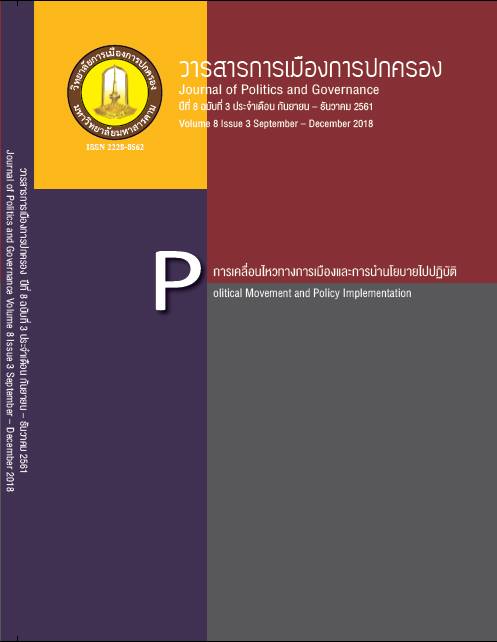Cultural Diplomacy : Thailand’s Foreign Policy to Indochina, the Neighboring Countries
Main Article Content
Abstract
Promoting the relationship among neighboring countries in Indochina is extremely significant. Thailand’s foreign policy to Indochina countries after the cold war has been changed from conflicts to cooperation. As a result, cultural diplomacy plays a key role for Thailand as a cooperating tool to establish a good relationship among the bordering countries. Moreover, this diplomatic way builds trust between each other in terms of co-assisting and co-developing in accordance with politic, economic, social, and cultural policies. According to Thailand’s foreign policy, cultural diplomacy to the Indochina after the cold war mainly intends to the following assistances and cooperation: (1) academic assistance, trainings, and scholarships, (2) cooperation of Buddhism and cultures, and (3) cooperation of Thai-language teaching. The implementations of Thailand's foreign policy towards its Indochina neighbors are based on cultural tools in order to create government-to-government and people-to-people relationships including promoting the image and confidence. This will lead to the strengthening of cooperation and mutual stability
Article Details
References
กระทรวงการต่างประเทศ. (2560). รายงานประจำปี 2558 กระทรวงการต่างประเทศ. กรุงเทพฯ:บริษัท สไตล์ครีเอทีฟเฮ้าส์ จำกัด.
โกสุมภ์ สายจันทร์. (2556). อนุภูมิภาคลุ่มน้ำโขงในความสัมพันธ์ระหว่างประเทศ. เชียงใหม่ : สำนักวิชาการระหว่างประเทศ คณะรัฐศาสตร์และรัฐประศาสนศาสตร์ มหาวิทยาลัยเชียงใหม่.
จุฑาทิพ คล้ายทับทิม. (2551). หลักความสัมพันธ์ระหว่างประเทศ. กรุงเทพฯ: สำนักพิมพ์มหาวิทยาลัยเกษตรศาสตร์.
ชัยโชค จุลศิริวงศ์ (บก.). (2536). 5 ทศวรรษการต่างประเทศของไทย จากความขัดแย้งสู่ความร่วมมือ. กรุงเทพฯ: พรีสเกล จำกัด.
ธัญญาทิพย์ ศรีพนา. (2550). นโยบายตางประเทศของเวียดนามหลังปี 1986: กรณีนโยบายของเวียดนามต่อไทย. กรุงเทพฯ: บริษัท เลคแอนด์ฟาวด์เท่น พริ้นติ้ง จำกัด.
วงศ์ พลนิกร. (2542). นโยบายต่างประเทศที่พึงปรารถนาและแนวความคิดของท่านปรีดี พนมยงค์.กรุงเทพฯ : มูลนิธิเด็ก.
สถาบันการต่างประเทศ กระทรวงการต่างประเทศ. (2548). คำศัพท์- คำย่อ การทูตและการต่างประเทศ. กรุงเทพฯ:หจก. ภาพพิมพ์.
สมชาย ภคภาสน์วิวัฒน์. (2555). ระเบียบโลกใหม่. กรุงเทพฯ:อมรินทร์พริ้นติ้งแอนด์พับลิชชิ่ง.
สโมสรสราญรมย์. (2541). สราญรมย์: ฉบับที่ระลึก ครบรอบปีที่ 55. กรุงเทพฯ: อมรินทร์พริ้นติ้งแอนด์พับลิชชิ่ง.
สมคิด โชติกวณิชย์ (บก.). (2532). สู่โฉมหน้าใหม่ของวัฒนธรรมกับการพัฒนา. กรุงเทพฯ: สำนักงานคณะกรรมการวัฒนธรรมแห่งชาติ กระทรวงศึกษาธิการ.
Joseph S. Nye, JR. (2004). Soft power :The Means to Success in World politics. New York: Public Affairs.


